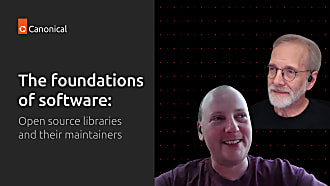Canonical
on 16 August 2010
Canonical is pleased to announce the release of Ubuntu’s multi-touch and gesture stack. With Ubuntu 10.10 (the Maverick Meerkat), users and developers will have an end-to-end touch-screen framework — from the kernel all the way through to applications. Our multi-touch team has worked closely with the Linux kernel and X.org communities to improve drivers, add support for missing features, and participate in the touch advances being made in open source world. To complete the stack, we’ve created an open source gesture recognition engine and defined a gesture API that provides a means for applications to obtain and use gesture events from the gesture engine.
Our multi-touch work began in Ubuntu 10.04 LTS, when we worked to get additional touch hardware supported in the Linux kernel, particularly the Dell XT2, HP tx2 tablets and the Lenovo T410s laptops. With that in place, and active development in X well under way, we reviewed our options for gesture recognition in Linux. The Maverick cycle has seen us produce several prototypes for gesture recognition software and the Ubuntu archives now include the results of that effort.
The world’s expectations of software experience are being raised by advances in mobile computing. We are bringing that revolution to the Linux desktop: for window management and applications. Though our work at the application level has only just started, we are certain that multi-touch and gestures will be central to the way we use Linux applications in future.
The success of touch in applications depends on several key factors:
- toolkit integration of gesture APIs
- touch support for legacy applications
- designing new applications for finger-based interactions
Work has begun on all three fronts in Ubuntu, and we expect it to remain an area of active interest over the next few releases up to 12.04 LTS.
Ubuntu is the fruit of collaboration across the huge Ubuntu community, and also the amazing work of many other communities that form around individual projects and initiatives like Debian. The touch framework enables work to begin across many of those communities to make touch a first-class interaction model in open source desktop and mobile software.
Existing contributions in other projects have provided fertile ground for touch. To name just a few:
- Stéphane Chatty at ENAC has lead much multi-touch hardware support in the kernel
- Peter Hutterer at Red Hat defined multi-pointer X and proposed a multi-touch protocol for a future version of X
- Carlos Garnacho of the GNOME community has done multi-touch work in X and GTK
We’re look forward to continued collaboration, ensuring that Linux remains the preferred platform for people building cutting-edge devices and software.
Canonical is working with manufacturers of touch-enabled products and those of their underlying technology in order to bring innovations in user experience to a broader audience. Our aim is to bring the natural, tactile experience of the world to the desktop, window manager, and applications you value — all the software that you depend upon to get things done and have fun. Touch will be part of the Ubuntu Netbook, Desktop and Light products from 10.10 and beyond.



